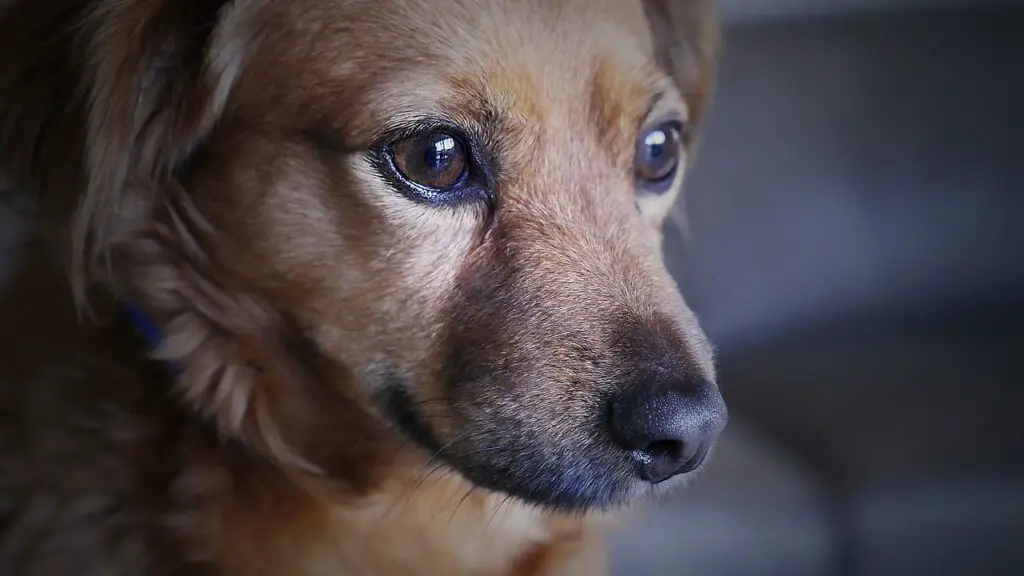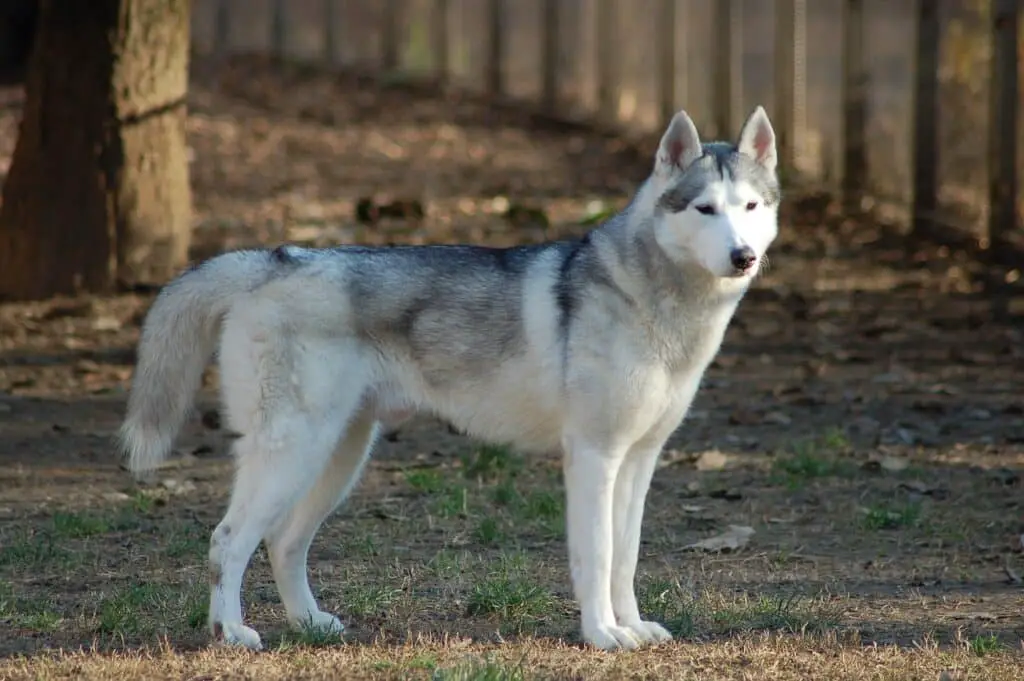There are many reasons why your husky may be sad, ranging from boredom to illness.
If you’re not sure what’s causing your husky’s sadness, take her to the vet for a checkup.

Could Be Lack of Exercise
Lack of exercise is one of the most common causes of depression in dogs.
If your dog isn’t getting enough exercise, she will begin to show signs of depression.
These signs include lethargy, lack of energy, and a decreased appetite.
Here are some other things that could indicate lack of exercise:
- Excessive panting
- Inability to get up after lying down
- Difficulty walking or running
- Appetite loss
- Increased sleeping (which can lead to exhaustion)
- Changes in behavior including aggression, anxiety, and fearfulness
- Tiredness
- Poor grooming habits
- Decreased activity
- Weight gain
If you suspect that your dog may be suffering from depression due to lack of exercise, it’s important to get her checked out by a veterinarian right away.
In addition to checking for physical issues, the vet should also make sure there aren’t any underlying medical conditions that could be contributing to your dog’s symptoms.
Might Be Bored
Your husky is bored if he spends most of his time sleeping or lying around the house.
He won’t be happy unless he gets plenty of exercise and playtime.
If you notice that your dog isn’t particularly active, it could be because he’s bored with life.
Try giving him some exciting new activities, such as agility training, obedience classes, or even just taking him on an adventure!
Not Getting Enough Attention
A husky is happiest when he’s getting plenty of attention and affection.
That said, some huskies have an innate need to be alone or in the company of another dog — especially if they were raised with other dogs as puppies.
If you adopted your husky from a shelter, she may also be shy of new people and animals.
If your husky has been neglected or abused, she may be scared of strangers and unfamiliar environments.
She may also be afraid of loud noises, such as sirens and barking dogs.
If you notice that your husky is reluctant to go out on walks or play at all, it could be due to fear.
The best way to help your husky overcome these fears is by spending time with her every day.
If your husky seems to be over-stimulated by too much attention, try giving her a break.
Limit your interactions with her so that she doesn’t become overwhelmed, and then slowly reintroduce yourself into her life.
Could Be Sick
If your husky is sick, it could be any number of things.
The most common illnesses that cause dogs to become depressed include cancer, diabetes, kidney or liver disease, and urinary tract infections (UTIs).
It’s important to know how to tell if your dog has an illness so that you can get to the bottom of the problem as soon as possible.
Here are some ways to tell if your husky needs medical attention.
Depression
Dogs who are sad do not have a happy disposition.
They don’t want to play, they don’t want to cuddle, and their body language changes dramatically—they often curl up into themselves or hide under a blanket.
Other signs of depression include lethargy, loss of appetite, lack of interest in normal activities, decreased activity levels, and excessive sleeping.
Diabetes
Your husky will show signs of diabetes when she becomes very thirsty and eats more than usual.
Diabetes causes a dog’s blood sugar to rise above normal, which leads to increased thirst and hunger.
Other symptoms of diabetes include frequent urination, weight loss, and increased sensitivity to light.
Kidney Disease
Signs of kidney disease include vomiting, diarrhea, and weight loss.
Another symptom is a change in your dog’s urine color.
A yellowish-brown urine indicates hematuria, which is a sign of kidney disease.
Your dog will also need to drink more water than usual because she won’t be able to hold on to the fluid she drinks.
Another way to tell if your husky has kidney disease is by testing her for proteinuria.
Proteinuria occurs when your dog’s urine contains high amounts of proteins.
You can test proteinuria with a dipstick.
Liver Disease
If your husky is having trouble breathing, she may have liver disease.
Liver disease affects the dog’s ability to digest food properly.
Signs of liver disease include lethargy, vomiting, and diarrhea.
Urinary Tract Infection (UTI)
If your husky is experiencing pain while urinating, she may have an UTI.
Symptoms of this condition include painful urination, bloody discharge, and fever.
It isn’t uncommon for a dog to experience these symptoms, but a vet should be consulted immediately if your husky experiences them regularly.

Could Be in Pain
Sickness is often the first thing that comes to mind when we think of our dogs.
However, pain can also cause dogs to be sad.
Dogs have more nerve endings than humans do and therefore they feel pain much more acutely.
For example, a dog who has been bitten by another dog will likely experience severe pain.
In addition, dogs with joint problems or other illnesses such as cancer can experience painful symptoms.
If your dog seems depressed and tired all the time, it could be because he’s in pain.
Treatment Options
If your husky is in pain, there are several treatment options available.
Medications can help relieve pain, but only if they’re prescribed by a veterinarian.
Over-the-counter medications like Tylenol or Advil should never be given to a dog without consulting a vet.
For mild to moderate pain, your vet may prescribe an anti-inflammatory medication.
These medications act on the body’s immune system to reduce inflammation.
They can be used alone or along with nonsteroidal anti-inflammatories (NSAIDs).
NSAIDs work by blocking certain chemicals in the body that cause pain and swelling.
A common side effect of these medications is nausea.
Dogs with severe pain will require stronger medications.
The most commonly used prescription drugs for this purpose are opioids and tramadol.
Opioids are powerful narcotics that can be used to treat pain caused by injury or illness.
Tramadol is a synthetic opioid similar to codeine.
It works well on its own, but it can also be combined with NSAIDs.
As with any drug, however, there is a risk of addiction.
Home Remedies
Sometimes, taking your dog to the vet isn’t an option.
If your dog is experiencing pain, try giving him some home remedies instead.
Homeopathic remedies are usually safe and effective at relieving minor aches and pains.
Look for products that contain the active ingredient Arnica Montana, which is known to reduce pain and swelling.
You can find it in preparations such as Petitgrain or Arnica 200C.
You can also make an herbal remedy using marshmallow root.
This herb is native to North America and is used in both traditional and alternative medicine.
Make a tea by simmering 1/4 cup of dried marshmallow root in 2 cups of water for 20 minutes.
Let the mixture cool before feeding it to your dog.
Some people add honey to the tea to sweeten it.
Could Be Grieving
A dog may experience grief when they lose someone or something important to them.
This can happen for any reason, such as death, separation, or moving away.
The loss of an object, person, place, or activity is called “griefing.”
It’s similar to mourning, which is the process of grieving that occurs after a significant loss has occurred.
When a husky loses a companion, he may start showing signs of grief.
These include lethargy, lack of interest in food and water, decreased playfulness, and restlessness.
A husky who is grieving may also exhibit other behaviors, including panting, drooling, pacing, urinating on things, excessive licking, and sleeping more than usual.
Separation Anxiety
If you have recently moved into a new house with your husky, she may be experiencing some separation anxiety.
This is common for dogs because it’s hard for them to leave familiar places.
They want to stay close to their owners and try to comfort them when they’re scared or upset.
Separation anxiety can cause a husky to become restless and fearful.
She may pace back and forth, bark incessantly, refuse to go outside, or hide under furniture.
She may even vomit if she feels unsafe.
Some people think that huskies are prone to separation anxiety due to their breed’s history as a working breed.
Before being domesticated, these dogs were used to living outdoors and sometimes had to be left alone for long periods of time.
Illness
Dogs can get sick just like humans do.
Sometimes, sickness can make your husky feel very sad.
Even though they’re normally healthy, they can still catch illnesses from other animals or people.
If your dog experiences symptoms such as vomiting, diarrhea, or bleeding, it could be due to a serious condition known as Parvovirus.
Check with your veterinarian immediately if you suspect this.

Could Be Experiencing Separation Anxiety
Huskies have a natural fear of being left alone, and if they don’t know how to cope with this stress, they can become very anxious.
They often get upset when they see other dogs or even people approaching their house.
This is because they associate these things with being abandoned.
Even though it’s only temporary, it can still cause them distress.
To help your husky feel less anxious about being left alone, keep her busy by taking her out on walks every day.
When you bring your dog back home, give her a treat to show that you love her, then leave again so she has time to calm down before coming inside.
If you notice that your husky has started acting more nervous or aggressive around other dogs, try leaving her at home while you go out to meet up with friends.
It will make her feel safer knowing that you’ll always return.
If separation anxiety continues to bother your husky, talk to your veterinarian about possible medications to help relieve her discomfort.
Some popular options include anti-anxiety pills and antihistamines.
Separation anxiety can also result in destructive behaviors such as chewing or scratching furniture, which could lead to costly repairs.
To prevent this from happening, schedule regular playtime with your husky so he knows that you’ll always come back.
Read our article on training your husky to stop chewing on walls to learn more about preventing destructive behavior.
- What Dog Breeds Have Pink Skin? - March 24, 2023
- What Are the Most Inspiring Dog Breeding Quotes? - March 20, 2023
- Can Pheromone Spray Help Improve Dog Breeding Results? - March 19, 2023








